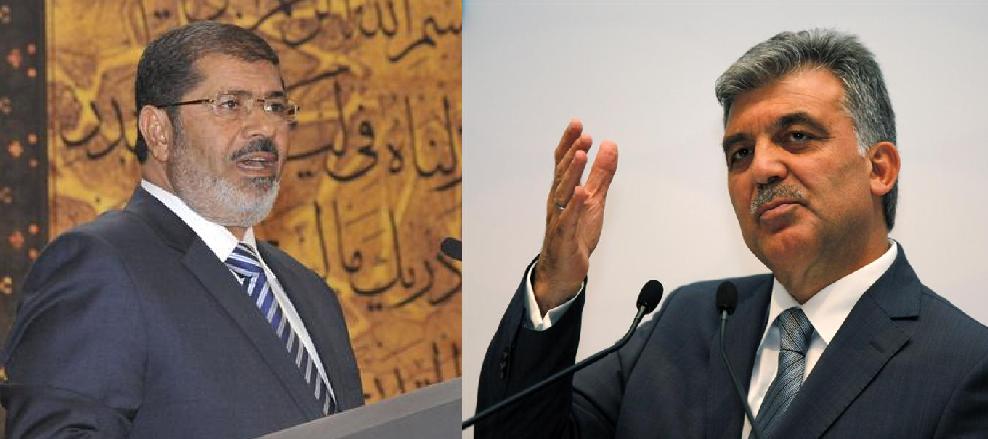Latest NEWS
- Aswat Masriya, the last word
- Roundup of Egypt's press headlines on March 15, 2017
- Roundup of Egypt's press headlines on March 14, 2017
- Former Egyptian President Hosni Mubarak to be released: lawyer
- Roundup of Egypt's press headlines on March 13, 2017
- Egypt's capital set to grow by half a million in 2017
- Egypt's wheat reserves to double with start of harvest -supply min
- Roundup of Egypt's press headlines on March 12, 2017
Egypt expels Turkish ambassador, Turkey retaliates

Egyptian President Mohamed Mursi and Turkish President Abdullah Gul. Reuters
CAIRO, Nov 23 (Reuters) - Egypt said on Saturday it was expelling Turkey's ambassador and accused Ankara of backing organisations bent on undermining the country - an apparent reference to the Muslim Brotherhood of ousted Egyptian president Mohamed Mursi.
Turkey, which had forged close ties with Egypt under Mursi, responded by declaring the Egyptian ambassador, currently out of the country, persona non grata.
"We are saddened by this situation," Turkey's foreign ministry said in a statement. "But responsibility before history belongs to Egypt's temporary administration which came to power under the extraordinary circumstances of the July 3 coup."
Turkey has emerged as one of the fiercest international critics of Mursi's removal, calling it an "unacceptable coup". Mursi's Muslim Brotherhood, which has been staging protests calling for his reinstatement, has close ties with Turkish Prime Minster Tayyip Erdogan's AK Party.
"(Ankara is) ... attempting to influence public opinion against Egyptian interests, supported meetings of organisations that seek to create instability in the country," Egyptian foreign Ministry Spokesman Badr Abdelatty said, in explaining why the Turkish ambassador had been asked to leave.
In response to Egypt's decision, Turkish President Abdullah Gul spoke live on state run TRT television, saying: "I hope our relations will again get back on track."
Both countries will remain represented in each other's capitals by embassies headed by a charge d'affaires, effectively a number two.
Both had recalled their ambassadors in August for consultation after Egyptian security forces stormed into pro-Mursi camps on August 14, killing hundreds.
RISING TENSIONS
In some of the worst civilian violence in decades, security forces crushed protests by Mursi's supporters. Militant Islamists, who have been attacking Egyptian forces in the Sinai peninsula, stepped up their assaults in or near major cities.
Relations deteriorated between Egypt and countries that criticised Mursi's ouster and the government crackdown on the Brotherhood where thousands have been arrested.
Qatar, once a major ally to Egypt under Mursi which lent or gave Egypt $7.5 billion, condemned the security forces crackdown against the Brotherhood in August. Egypt described the statement as an interference in its affairs.
In September, Egypt returned a $2 billion Qatari deposit with its central bank after talks to convert the funds into three-year bonds broke down.
On another front, Egypt is seeking to diversify its sources of military equipment and is even warming to Russia after the United States decided in October to curb military aid to Egyptpending progress on democracy and human rights.
Earlier this month Egypt's defence minister hailed a new era of defence cooperation with Moscow after a historic visit by Russia's defence and foreign ministers to Egypt. The two countries have yet to announce any major deals.
Egypt's army-backed interim government is implementing what it calls a roadmap to democracy that could see fresh elections by early next year. (Reporting by Asma Alsharif and Ali Abdelatty, and Seda Sezer in Turkey.; Editing by Ralph Boulton)










